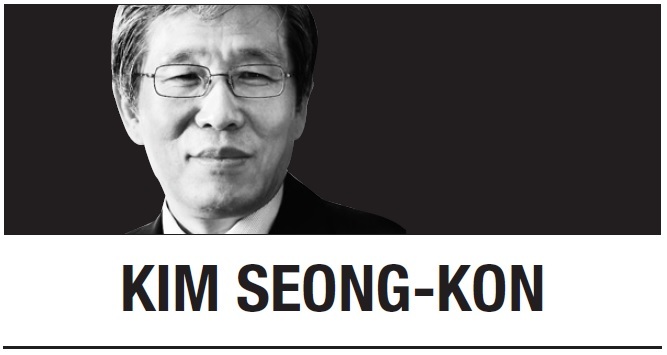[Kim Seong-kon] We lost our guiding star Lee O-young
By Kim Seong-konPublished : March 2, 2022 - 05:31

Professor Lee lived an admirable life with fame and honor. A renowned literary critic and prolific bestselling author, he was the minister of culture in the early 1990s and, later on, distinguished professor emeritus at Ewha Womans University. Last year, he received the highest medal of cultural merit from the Korean government. Lee was one of the representative intellectuals of Korea, whom we could proudly present as a cultural ambassador overseas.
Lee O-Young was a true pioneer in iconoclasm. At age 23, he made a forceful literary debut by publishing the monumental essay, “Destruction of an Idol.” In that essay, he challenged the hegemony of three senior literary icons: literary critics Baek Cheol and Cho Yeon-hyun, and canonical poet So Chong-ju. Reading his iconoclastic books such as “Literature of Protest,” “Literature in the Age of Curfew” or “The New Wave of Postwar Literature” is not only highly pleasing, but also illuminating. His insightful book, “In This Earth and in That Wind,” too, mesmerizes the reader with its fresh perspectives on Korean culture.
Lee’s iconoclastic attitude inspired Korean youth so much that it was fashionable for college students to carry his books under their arms in the 1960s. I was one of those college students in the ‘60s who admired his literary works greatly. It was an eye-opening experience to absorb his profound insights and powerful language. I did not know how stylish and beautiful the Korean language could be until I read his books. His vast and profound knowledge of Eastern and Western civilizations was also deeply impressive. He saw what others could not see and his comparative perception was always penetrating and intriguing. Ever since my college years, therefore, he has been my mentor and role model. Lee was such a famous iconoclast, and yet ironically, he in turn became the idol of a generation of Korean scholars and writers.
Lee’s literary criticism helped usher in the new wave of Korean literature and led the spiritually wandering young people of Korea as a guiding star. At the same time, he was a cult hero who represented a new era and had many followers who worshipped him. Few people knew that he was an expert in computer technology. In his study, he had two computers, which he operated at the same time skillfully. When the computer was not available yet in Korea, Daewoo marketed a word processor named Le Mots II in the mid-1980s. At the time, he bought two of them and urged me to buy one, too, which I did.
Indeed, Lee was characteristically ahead of his time. In the 1970s, when few Korean scholars were aware of what postmodernism was, he already asked me to write about literary postmodernism and to interview American literary critic Leslie Fiedler, a leader of that movement, for the prestigious journal Lee edited, “Literature & Thought.”
When I was still a college student who adored his books, I scarcely dreamed I would ever have the opportunity of meeting him in person. However, we not only eventually met, but we enjoyed a special friendship for many years. Among others, I contributed regularly to his journal for five years and later became editor-in-chief of the journal myself, following in his footsteps. Before he passed away, professor Lee summoned me to his house and told me that he wanted me to be one of his two spiritual heirs, together with Professor Jung Jae-seo, a distinguished scholar of Chinese literature. This was one of the utmost honors and privileges of my life; I felt like I had been knighted by a king. Because he was already physically so weak that he could not sit behind the desk for a long time, we decided to have a series of several long conversations in order to publish them in book form later.
However, partly due to my laziness and partly due to my obligation to take care of my baby granddaughter, I was not able to finish the book before he passed away. I know he would have been delighted to see the book, and I feel guilty for it. Of course, he graciously understood the situation. In a sense, professor Lee sacrificed his pleasure for my granddaughter, who symbolizes the future.
We sincerely mourn the great culture critic’s passing. No one could fill in the vast vacuum of his absence. Although he is no longer with us, his giant shadow will remain with us for a long time and continue to guide us on the right path.
Kim Seong-kon
Kim Seong-kon is a professor emeritus of English at Seoul National University and a visiting scholar at Dartmouth College. The views expressed here are his own. -- Ed.








![[Graphic News] More Koreans say they plan long-distance trips this year](http://res.heraldm.com/phpwas/restmb_idxmake.php?idx=644&simg=/content/image/2024/04/17/20240417050828_0.gif&u=)
![[KH Explains] Hyundai's full hybrid edge to pay off amid slow transition to pure EVs](http://res.heraldm.com/phpwas/restmb_idxmake.php?idx=644&simg=/content/image/2024/04/18/20240418050645_0.jpg&u=20240419100350)





![[From the Scene] Monks, Buddhists hail return of remains of Buddhas](http://res.heraldm.com/phpwas/restmb_idxmake.php?idx=652&simg=/content/image/2024/04/19/20240419050617_0.jpg&u=20240419175937)

![[KH Explains] Hyundai's full hybrid edge to pay off amid slow transition to pure EVs](http://res.heraldm.com/phpwas/restmb_idxmake.php?idx=652&simg=/content/image/2024/04/18/20240418050645_0.jpg&u=20240419100350)

![[Today’s K-pop] Illit drops debut single remix](http://res.heraldm.com/phpwas/restmb_idxmake.php?idx=642&simg=/content/image/2024/04/19/20240419050612_0.jpg&u=)